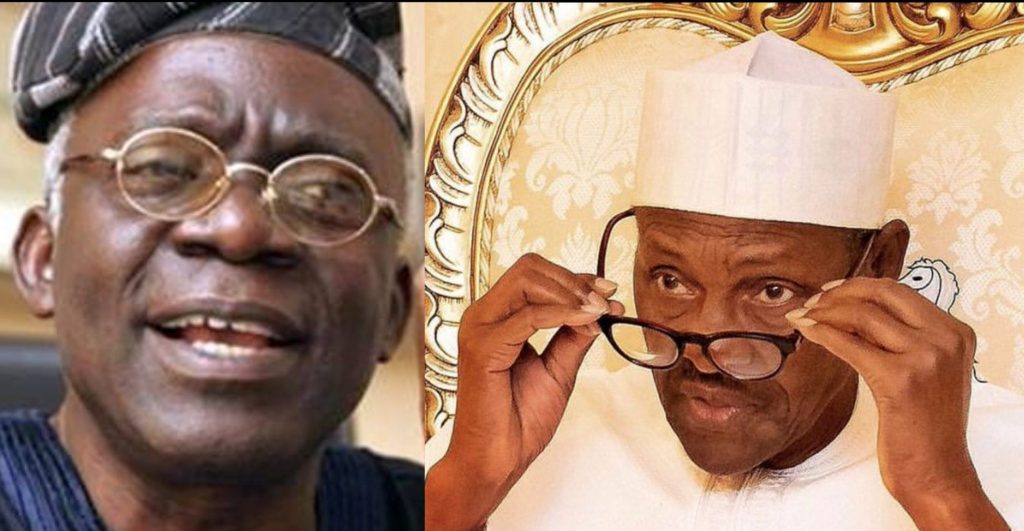
Ahead of the December 19 deadline for the presidential assent to the 2021 Electoral Act Amendment Bill, Human Rights Lawyer, Femi Falana has called on the National Assembly, journalists, Civil Society Organizations (CSOs) and citizens to insist on the bill becoming law. The National Assembly had on November 19 transmitted the Electoral Bill 2021 which grants the Independent National Electoral Commission (INEC) powers to deploy electronic transmission of election results to President Muhammadu Buhari for assent.
Falana made the call while giving a keynote speech at TheCable Colloquium attended by the Progressive Impact Organization for Community Development (PRIMORG) Wednesday in Lagos.
Highlighting the importance of the Electoral Bill awaiting presidential assent, he expressed disappointment in the length of time it is taking President Buhari to assent such an important amendment, noting that some governors in the All Progressives Congress (APC) are behind the president’s reluctance to assent to the electoral act.
Falana maintained that the governors are not against the Electoral Act amendment only because of indirect primaries which the National Assembly adopted in the bill but are rather concerned about the provision of electronic voting and transmission of results, which he said would reduce election manipulation and fraud to the barest minimum.
“The president is reluctant to give assent to the bill because the powerful governors in his party, the ruling party, are saying it is going to be much more expensive for them to run direct primaries.
“Therefore, they are saying throw away the baby and the bathwater. But where they’re going is that those governors have not recovered from the shock of having an electronic vote. They know manipulation will be reduced to the minimum.
“That’s why they are asking the president to throw away that bill. They aren’t saying take it back to the National Assembly so that the area of direct primaries can be removed.
“The bill can be rejected only on one ground. The 2018 bill was rejected by the president on the ground that it’s too close to the 2019 election. Now, the president may also say signing this bill now may be too close to the election and might cause confusion,” Falana said.
He, however, called on the members of the National Assembly to do all they could as well as explore other options to ensure the Electoral Act is signed into law, as well as journalists, media houses and Civil Society Organizations (CSOs) to sustain the pressure on the legislative arm of the government to pass the bill in an event the president refuses assent.
“The media has a great task in ensuring the Electoral Act is signed, that’s why I call on all media houses to insist on the passing of the bill.
“Civil Society Organizations, citizens and groups should push the National Assembly,” Falana stressed.
He noted that journalists played a major role against colonialism and military regimes, hence can galvanize effort towards holding political leaders accountable and mobilizing the citizens in the same regard.
“Nigeria needs investigative journalism to get good governance, many people are declaring interest to become Nigeria president in 2023, journalists should ask the politicians jostling for these elective positions in 2023 questions on development and service delivery,” Falana stressed.
The adoption of direct primary for the nomination of candidates by political parties emerged as the most contentious clause out of the 21 clauses amended in the 2021 Electoral Act.
It will be recalled that upon transmission of the bill to President Buhari he sought the observations of the Independent National Electoral Commission (INEC) on the bill.
Buhari has until December 19 to sign the bill or withhold his assent and communicate his objections to the National Assembly.
On the other hand, the constitution allows the National Assembly to override Buhari by a two-third vote in a case the president takes no action on the bill.
About Author
You may also like
-
Anti-Corruption: Whistleblowing Law Long Overdue – Activists, Lawyers Counsel FG
-
N12bn Bribery Scandal: EFCC Urged To Prosecute Indicted Nigeria Customs Officials
-
NEIP: ICPC Harps On Collective Fight Against Corruption
-
ICPC Says Constituency Projects Tracking Declining Corruption, Urge Nigerians To Report Infractions
-
Birth Certificates: Corruption Unabated in Registration Centers — FG Alerted
